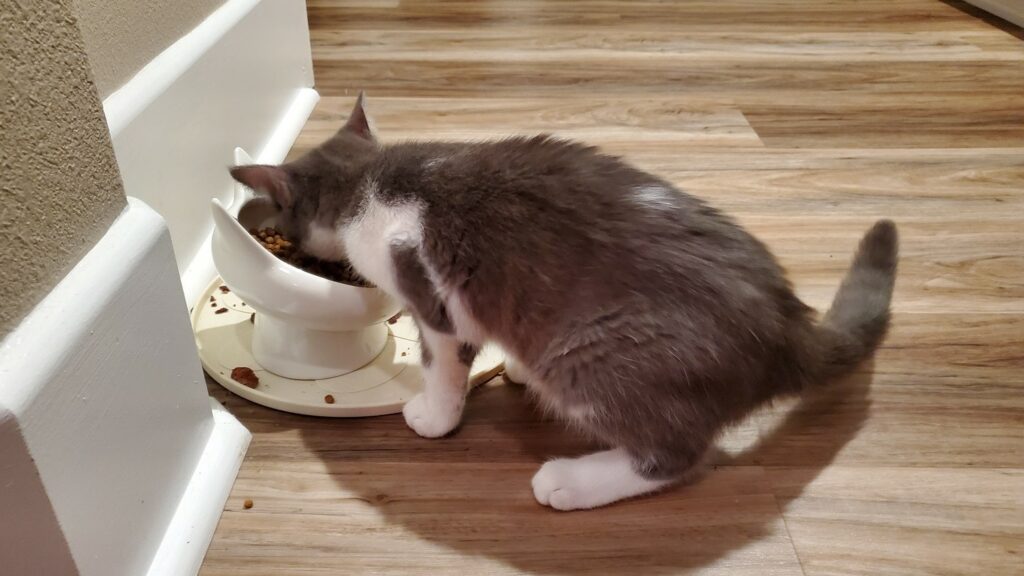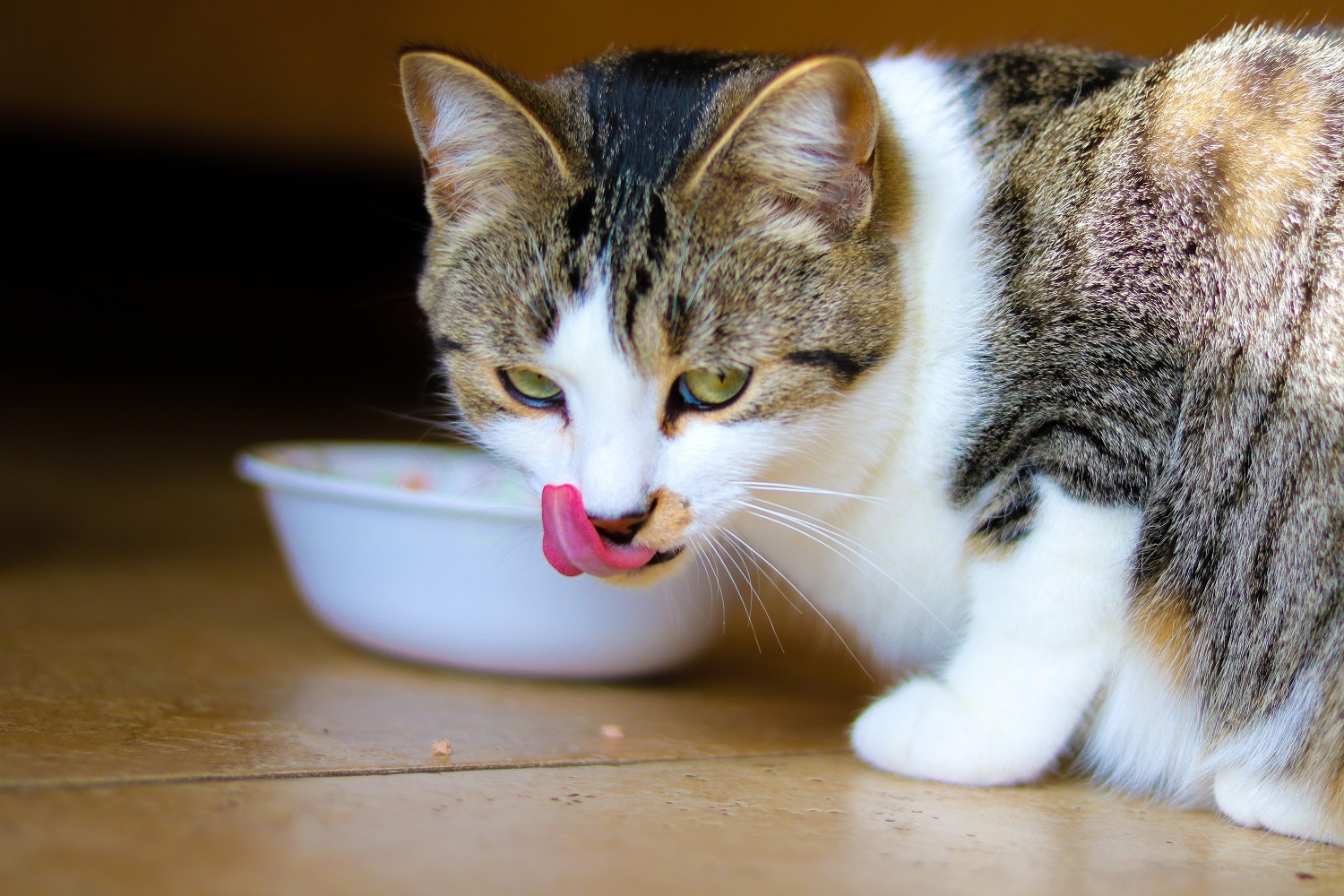You just filled your kitten’s bowl with a fresh helping of food, and instead of digging in, they start pawing at the floor like they are preparing to plant it. If your first thought is, “What on earth is happening?” you are not alone.
This behavior might look a little strange, but it is perfectly normal. Kittens trying to bury their food are acting on instinct, not staging a tiny rebellion against your feeding choices. What you are witnessing is a throwback to behaviors rooted deep in feline survival.
Let’s dig into why kittens do this, what it means, and whether or not you should be concerned about their attempts to redecorate the kitchen floor.
The Instinct Behind Burying Behavior
The urge to bury or cover leftover food is tied to wild cat behavior. In nature, leaving uneaten food out in the open is risky. It can attract predators or rival animals, and it wastes valuable resources.
Feral cats often try to cover leftover food or even excrement with dirt, leaves, or debris to keep their location hidden and avoid drawing unwanted attention. Your domesticated kitten may have never faced a single predator in their life, but that instinct is still hardwired into their behavior.
Since there is no dirt available in your kitchen or living room, kittens will often mimic the motion by pawing at the floor, dragging a towel, or even trying to push a placemat over their bowl. They are not being picky or weird. They are just following ancient survival rules.
When and Why Kittens Do It
Not every kitten will try to bury their food, but many do. Here are some of the most common reasons behind this curious ritual.
1. They Are Full and Saving It for Later
If your kitten eats a few bites and then starts trying to cover the rest, they may be planning to return later. It is the feline version of leftovers, only without the fridge.
2. They Do Not Like the Food
In some cases, kittens will try to bury food they find unappealing. If they consistently paw at a certain brand or flavor but eat others without issue, they might be expressing disapproval in the most passive-aggressive way possible.
3. They Are Being Overfed
If your kitten is consistently leaving large amounts of food behind, you might be giving them more than they need. Check with your vet to make sure you are feeding the right portions for their age, weight, and activity level.
4. They Are Playing
Sometimes what looks like burying behavior is actually just playful pawing. Kittens are curious creatures, and they often turn mealtime into a mini-game. If they are pawing at the floor, pushing the bowl, or attacking invisible enemies around the dish, it could be part of their daily entertainment.
5. They Are Reacting to Scent or Texture
Cats have extremely sensitive noses. If something smells too strong, too unfamiliar, or just plain off to them, they may try to cover it like they would cover waste. This is especially common with certain wet foods or fishy flavors.
Is It Something You Should Worry About?
Most of the time, no. Food burying in kittens is normal, harmless, and usually more amusing than anything else. As long as your kitten is eating well, growing steadily, and showing no signs of illness, this behavior is nothing to worry about.
However, if it suddenly starts out of nowhere or is accompanied by other changes like vomiting, diarrhea, or refusal to eat, it is worth a call to your vet. A sudden change in behavior could indicate that something is bothering them physically.
Also, if the burying becomes obsessive or disrupts their eating habits, it might help to adjust their feeding routine.

Oh, like you’ve never hidden a box of cookies to save for later? Seriously… #HypocriteHumans #I’llBeHungryLater #NeverMissAMeal #CookiesAreForKitties
Joey
Tips to Manage or Reduce Burying Behavior
If your kitten is aggressively pawing around their bowl or constantly trying to stash food under the rug, you can try a few simple adjustments to redirect the behavior.
Use a placemat or tray
Put the food bowl on a placemat or tray to give your kitten a safe space to paw without damaging the floor. It also makes cleanup easier.
Offer smaller portions more frequently
Feeding smaller amounts more often can reduce the urge to “save” food for later. It also keeps the food fresher and more appealing.
Remove uneaten food after 20 to 30 minutes
If your kitten walks away and starts trying to bury what’s left, go ahead and remove it. This reinforces that mealtime has a beginning and an end.
Change the feeding location
Some cats are picky about where they eat. If the current spot is near a litter box, loud appliance, or high-traffic area, try moving it to a quieter place.
Try different bowls or feeding surfaces
Flat dishes or puzzle feeders can reduce anxiety around food and make mealtime more engaging. Some kittens dislike deep bowls that crowd their whiskers.
Final Thoughts: It Is Not Rude, It Is Instinct
Watching your kitten paw around their food dish like they are burying treasure might seem odd at first, but it is a totally normal behavior. It reflects the natural instincts passed down from their wild ancestors and does not mean anything is wrong.
As long as your kitten is eating enough and otherwise healthy, this habit is more about instinct than anything else. You can choose to accommodate it, redirect it, or simply enjoy the show.
Either way, you have got a kitten who is tuned into their inner wildcat. And that is pretty cool.
Sources:
Why Do Cats Try to Bury Their Food? https://www.petmd.com/cat/behavior/why-do-cats-bury-their-food
Understanding Feline Instincts https://vcahospitals.com/know-your-pet/cat-behavior-problems-food-burying
Feeding Behavior in Cats https://www.icatcare.org/advice/cat-behaviour/feeding-behaviour-in-cats
Kitten Eating Habits and Behaviors https://www.humanesociety.org/resources/feeding-your-kitten
Recent Posts
Your Cat Might Be a Furry Little Healer… or at Least a Fuzzy Alarm System If you’ve ever had your cat suddenly become extra clingy when you’re under the weather, you’re not alone. From...
Cats are experts at hiding things, socks under furniture, their disdain for your playlist, and, unfortunately, symptoms of illness. In the wild, showing weakness could make them a target, so even...


